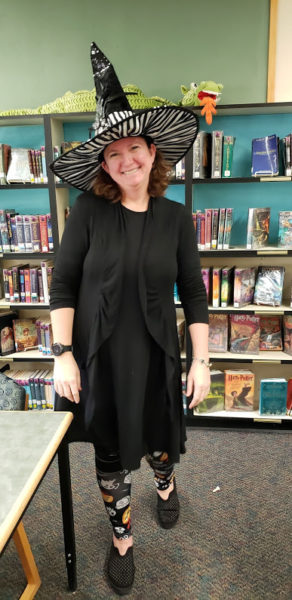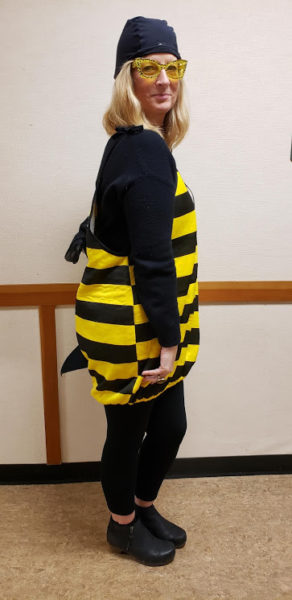Kids sobbing in the halls.
Kids screaming in the classrooms.
Fistfights in the lunchroom.
Welcome to Halloween in the elementary school.
Don’t get me wrong, there are cute costumes. There are adorable children. The staff has a lot of fun being creative.


But Halloween can be analogous to a horror movie. You know, draining the life out of you. Eating you alive.
And the next day isn’t any better. Kids amped up on a sugar high.
Then there are the kids with whole bags of candy at recess on November 1, distributing pieces to their friends. Kids with nothing but candy for lunch. Except for milk. Chocolate milk.
Plus, they haven’t had enough sleep.
Be still my heart.
This fall one school in the district next door to mine decided to cancel all Halloween events. No Halloween parade. No costumes or parties. The email to parents explained that they based their decision on equity and inclusion issues:
- some families don’t participate in the annual parade for financial or religious reasons
- some special needs students are sensitive to loud noises and heightened activity
They plan to have a fall festival a little earlier in October each year. I expect it will be something much more lowkey. I bet it won’t involve costumes or candy.
Nearly 500 parents signed an online petition trying to get the Halloween events reinstated.
Full disclosure, I tell my fifth-grade students that Hallowe’en is a contraction. It stands for “All Hallowed’s Eve.” Eve means evening. Which starts at sundown.
Which means Halloween has no part of the school day.
They moan and say, “Mrs. Kragen, you’re no fun.”
But then I do lots of other things that are fun—things that actually relate to materials I am teaching them—and they forgive me.
Last week, a few days before October 31, I heard about a movement to change Halloween, or at least the part the kids care about, to the last Saturday in October. The organizers want to call it National Trick or Treat Day.
People who observe All Hallowed’s Eve could still have that celebration on October 31. Adults could still have their parties then, if they want to stay up late on a work night. But parents could move the neighborhood trick or treating to the weekend.
Brilliant! I thought.
But how do you go about changing the holiday? And who’s in charge?
Turns out there’s a change.org petition that was started last year by the Halloween & Costume Association and updated this year. They note the change would make life easier for parents as well as kids if trick or treating was on the weekend instead of a workday/school day.
Having the festivities on a weekend means more parents can accompany their children, which would also make the event safer. According to Safe Kids Worldwide, “Twice as many kids are killed while walking on Halloween than any other day of the year.”
I can add, changing the festivities to the weekend would make life easier for your local teachers!
I brought up the idea to a variety of staff members at school on Thursday and Friday. The reactions I heard ranged from “lovely” to “awesome.”
I didn’t get a single “no” vote.
Inessa, I’m glad the post resonated with you. And I so appreciate the extra perspective you bring to the table. At my school it seems like we have extra students for Halloween! But I can see how in some communities attendance would be impacted. I can also see how new immigrant groups can change the dynamics of a community, making a much-loved tradition more problematic over time.
Hi Jan,
Wow. This is a topic I haven’t seen discussed much online or on other blogs, but Halloween is a topic of concern in my district. The school where I work does not allow Halloween parties or Halloween related activities, because there are both staff and students who do not celebrate Halloween. However, there is another school in my district which does allow students to come to school in costumes and for teachers to throw Halloween themed parties. The absences on that day skyrocket, because many of the students in that school are from Slavic backgrounds. Many Slavic people do not celebrate Halloween and will not send their children to school on that day, knowing that the school supports this celebration. It is so important to be sensitive to the concerns and needs of the community. Is it appropriate to celebrate a non-school related holiday when the celebration significantly impacts attendance?